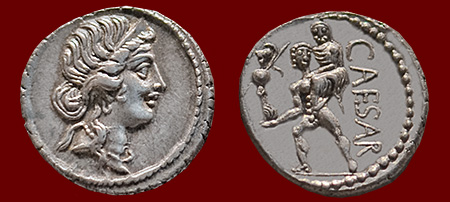 Obverse: head of Venus, Reverse: Aeneas with Anchises and Athena's Palladium |
Julia Marii was born ca. 130 BCE to C. Iulius Caesar II and Marcia, daughter of Q. Marcius Rex, who was a descendent of Ancus Marcius (4th King of Rome, 642-617 BCE) and co-consul in 118 BCE with Cato. Her siblings were C. Julius Caesar III (the father of Julius Caesar) and S. Julius Caesar III. At 20 years of age she married the general, C. Marius, and bore him a son; her distinguished maternal and paternal family connections advanced her husband's career. Renowned for her devotion to her husband and son, her reputation for virtue protected her during the Sullan prosecutions. Caesar, on the other hand, when Sulla gained control of Rome, was ordered to divorce his second wife, Cornelia, whom he had married when she was thirteen and he was eighteen. Cornelia, as the daughter of L. Cornelius Cinna, reinforced Caesar's ties with the Populares, the party led by his uncle Marius and opposed by Sulla. Cornelia's dowry was confiscated when Caesar refused Sulla's demand that he divorce her. Julia Marii, upon her death in 69 BCE, was given a public funeral in the Roman Forum by her nephew Julius Caesar who was then quaestor. In the following year he delivered another funeral oration from the Rostrum for his wife Cornelia (c. 97-68), mother of Julia, Caesar's only legitimate child, who later became the 4th wife of Pompey. There is little evidence about funerals for elite women earlier in the Republic: Livy (AUC 5.50.7) records that in c. 386 BCE the Senate voted the privilege of post mortem sollemnis laudatio to the matronae who contributed to the ransom of Rome from the Gauls, while Cicero (de Oratore 2.44) names Popilia, mother of the general and consul Q. Lutatius Catulus (150-87 BCE), as the first woman in Rome to be given the honor of a laudatio. In contrast Polybius describes lavish public funerals given for prominent men (Histories 6.53-54). While strong personal feelings may have prompted Caesar to publicly celebrate the lives of his aunt and wife, their funerals gave him as quaestor, on the first rung of the political ladder, a perfect opportunity to display the imagines of his ancesters and to remind fellow citizens of his descent from Venus on the Julian side of his family and to Roman kings on the other.
| Chapter 6 | |
| Quaestor Iuliam amitam uxoremque Corneliam defunctas laudavit e more pro rostris. Et in amitae quidem laudatione de eius ac patris sui utraque origine sic refert: | |
| "Amitae meae Iuliae
maternum
genus ab regibus
ortum,
paternum cum diis
immortalibus
coniunctum est. |
|
| nam ab Anco Marcio sunt Marcii Reges, quo nomine fuit mater; a Venere Iulii, cuius gentis familia est nostra. est ergo in genere et sanctitas regum, qui plurimum inter homines pollent, et caerimonia deorum, quorum ipsi in potestate sunt reges." |
|
Click on the underlined words for translation aids and
commentary, which will appear in a small window. Click on the icon link
![]() to the right of the
poem for related images and information.
to the right of the
poem for related images and information.